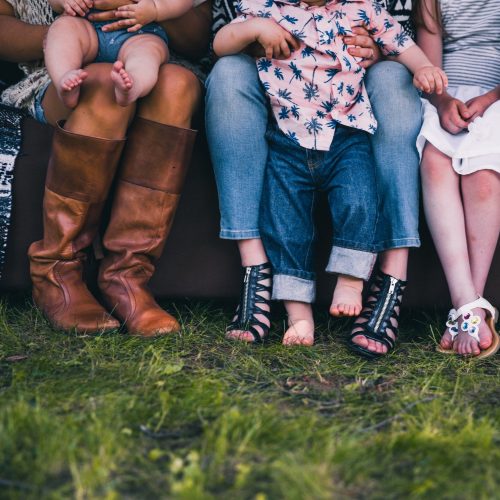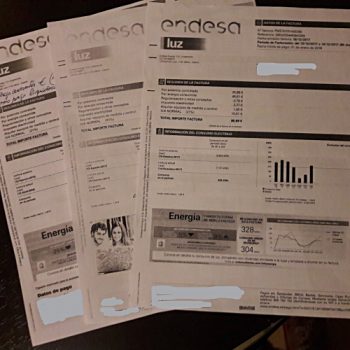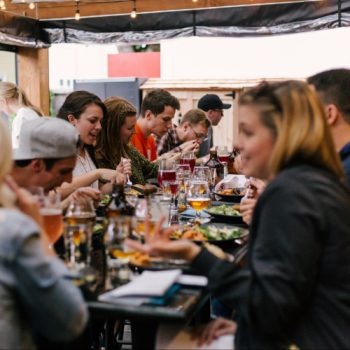
Your First Conversation with Your Host Family
Dear Stacey,
If you will be opting for a homestay while you study abroad or teach abroad in Spain, chances are that you may be anxious about your first conversation with your host family. It’s normal! Joining the household of complete strangers can be an uncomfortable experience at first and will probably be filled with awkward moments and linguistic misunderstandings. It’s normal that you want to make a great first impression but that you also may be unaware of how to do so in a new culture.
That’s why in this post we’re sharing some tips on behaviors and questions you can expect and topics you might want to prepare yourself for. All that being said, don’t worry if you feel unprepared, flustered, or awkward during your first interactions! Instead, be sure to read until the end of this article to hear about Dani’s experience, the embarrassing way in which she expressed herself, and the overall wonderful host family experience she had all the same!
What to expect when meeting your host family
 Spaniards tend to be exceptionally warm people by nature. The typical way of greeting someone is by giving them dos besos, or two kisses on the cheek, and so this is likely the way your host family will greet you.* Big hugs are also pretty standard greetings from host families in an effort to acknowledge from the very first moment that they want you to treat them like family.
Spaniards tend to be exceptionally warm people by nature. The typical way of greeting someone is by giving them dos besos, or two kisses on the cheek, and so this is likely the way your host family will greet you.* Big hugs are also pretty standard greetings from host families in an effort to acknowledge from the very first moment that they want you to treat them like family.
Keep in mind that many Spanish people tend to speak quickly and loudly, which may result in you understanding little in the first few moments. Of course, host families with a lot of experience may slow down their speech and enunciate to ensure you understand them, but don’t be surprised if you’re a little lost at first. A smile and a nod of the head as they tell you everyone’s name and explain their relations work fine and you can confirm the details later.
Something that deserves mentioning is that many of the host ‘families’ that work with study abroad programs actually consist of just one older lady, not a big family. Of course, everyone’s experience will be different and there are certainly people we know who have been placed with young couples who have children, resulting in a big bustling household. However, you may want to prepare yourself for the reality that you may instead be placed with an abuela who no longer has children at home and thus finds hosting international students to be a very enjoyable way to earn some income. This was Dani’s experience and, although she was slightly disappointed at first, she absolutely loved it and found the one-on-one quality time to be exactly what she needed!
Despite the chances of your host family consisting of elderly family members, you will likely find that you do not need to address them with the formal usted verb form. You can read in more depth about the differences between usted and tú forms and what we’ve experienced in our real world conversations here. Long story short: there’s nothing wrong with erring on the side of courtesy and using the usted version when you first meet your family but, 9 times out of 10, they will ask you to address them with the informal tú form as it feels more intimate and familial.
 What questions to expect from your host family
What questions to expect from your host family
The first time you meet anyone can be a little nerve-racking: What will they ask you? What should you say? What should you ask them? First and foremost, remember that you can’t really go wrong in this case, so if you just want to wig it, that is A-OK. At the same time, if you would like to feel more prepared and perhaps even practice your answers to common questions with someone, here are some topics you can expect your host family to bring up.
General
Where are you from? What’s your hometown like?
Tell me about your family. / Do you have any brothers or sisters? / What do your parents do?
How long have you been studying Spanish and why?
Why did you choose Spain (and specifically your city) to study abroad?
Have you ever been to Spain or Europe before?
Home / Lifestyle – related
What do you usually eat for breakfast?
What is your favorite food? Do you have any allergies?
Do you have any allergies?
Have you ever had Spanish food before? / Have you tried paella / tortilla de patatas / salmorejo / (insert any Spanish dish here)?
Is there anything you specifically don’t like to eat?
Do you watch a lot of TV?
Do you like to go out or stay in?
Do you plan to travel a lot?
School – related
What classes are you taking?
Are all of your classes in Spanish?
Are you taking classes through the program or directly at the university?
Do you know your class schedule?
Will you be home for la comida or will you need a sack lunch prepared for you?
Of course, depending on your answers to the above questions, your forthcomingness, and the curiosity level of your family, you may cover many more or many less topics than these. However, if you feel comfortable discussing things of this nature in Spanish, you will be more than prepared for that first conversation. Keep in mind that there will be a lot for you to take in as well—you’ll likely receive a tour of the house and instructions on what to do with laundry, how to use the shower, where certain foods are located in the kitchen, etc.
As a result of all this information and (what may feel like) interrogation, it’s normal for students to not return too many questions during that first exchange. However, if you’re feeling particularly confident or, alternatively, if you just need a moment to breathe and NOT answer a question, remember that your host family will be happy to share with you about themselves, too! Adding an inquisitive ¿y tú? to the end of your answer to ask “and what about you?” is a simple way to get to know your new family and score some brownie points as we imagine this returning of the conversation is not all that common on the first day.
Still feeling nervous? Take comfort in Dani’s funny first conversation story
I remember the day I received my Spanish host family placement as if it were yesterday. My study abroad program didn’t supply us with our placements before arriving. Instead, we were picked up at the airport by program staff and whisked away to a two-night orientation at the university before meeting any of our families. On the final day, we received a slip of paper with the name, address, and basic information about our families. It was exciting, but a bit anti-climatic as that piece of paper seemed so insufficient in terms of everything I wanted to know about the people I would be living with for the next five months.
Finally, they gathered all of us into an auditorium room and had us sit and wait for our host families to collect us, one by one. It was nerve-wracking but exciting. After having read and seen The Hunger Games, there’s a part of me that feels like the experience was similar to the lottery drawing. We all sat and waited for our names to be called, albeit with nerves out of excitement rather than fear. The wait seemed almost unbearable, but finally my name was called and I was immediately pulled into my first set of dos besos and sincere hugs from Spaniards. Then, in an instant, I was escorted away to my ‘host sister’s’ car with the women I would go on to call mamá for the rest of my time in Alicante. My new family…of complete strangers!
Arriving at mamá’s apartment remains a blur in my mind. The topics of intermittent conversation have completely escaped me. What I can’t forget, however, is sitting down on our living room couch to our first real conversation and feeling, admittedly, a bit unprepared. As expected, my host mother did not speak a word of English and so we communicated completely in Spanish. Despite my intermediate level, she was extremely patient. I think we forget that host families are going to be great at this—they are used to hosting foreigners! She asked me about my family and my hometown. She asked me how long I’d been studying Spanish and why. She asked me why I had chosen Alicante for my study abroad semester and if I had even been to Spain or Europe before.
 As she moved on from the general questions and got into more specifics of my lifestyle and class schedule, I got a little flustered while answering. I’ll never forget how I answered her inquiry into foods I don’t like: For whatever reason, I couldn’t remember the word for ‘seafood’ so I told her that I don’t really like fish and…other things…from the water…things that have eyes.
As she moved on from the general questions and got into more specifics of my lifestyle and class schedule, I got a little flustered while answering. I’ll never forget how I answered her inquiry into foods I don’t like: For whatever reason, I couldn’t remember the word for ‘seafood’ so I told her that I don’t really like fish and…other things…from the water…things that have eyes.
She must have gotten a great chuckle out of that answer, but she didn’t let on. Instead, she offered up the correct word I was missing (mariscos) and moved right onto the next question. I remember feeling so embarrassed at the time, but the reality was that it was all just fine and she never served me anything with eyes so that was an overall success!
If you’re especially nervous about that first conversation and making a good impression, our advice is two-fold. First, consider your answers to the questions listed above and anything else about your lifestyle and routine that you think your host family might need to know right away (i.e. being vegetarian, vegan, or Celiac). If you have someone you feel comfortable with, take some time to practice this conversation in Spanish before you meet your family.
 On the other hand, rest assured that your host family isn’t going to expect you to speak like Cervantes on your first day in their home and they absolutely won’t think less of your if your answers are unprepared or (as in Dani’s case) a little silly. The fact that you’re even contemplating these moments before you arrive shows that you’re on-top-of-the-game and we have faith that that first conversation will go just fine for you, too!
On the other hand, rest assured that your host family isn’t going to expect you to speak like Cervantes on your first day in their home and they absolutely won’t think less of your if your answers are unprepared or (as in Dani’s case) a little silly. The fact that you’re even contemplating these moments before you arrive shows that you’re on-top-of-the-game and we have faith that that first conversation will go just fine for you, too!
Sincerely,
Spain
*Of course, dos besos is the traditional Spanish greeting, but there is definitely a concerted effort during the current pandemic to eliminate this intimate greeting and instead tap elbows or wave while social distancing. However, this is a tradition that is so ingrained in the older generation that we would not be surprised if, in their excitement, your elderly host family members forget and go in for the dos besos.




